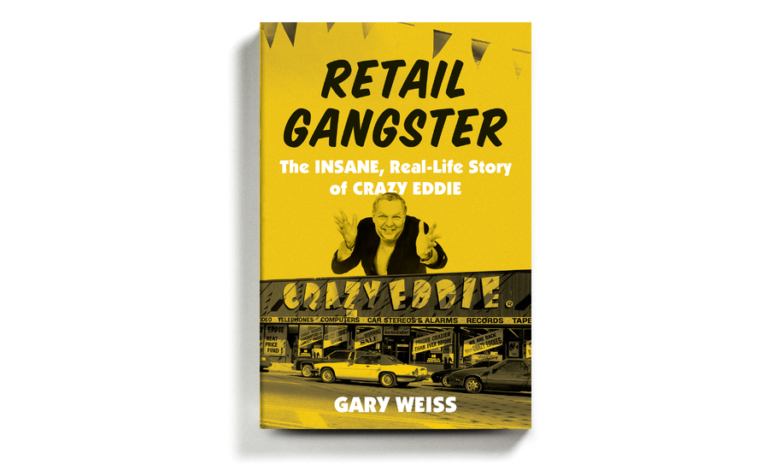Crazy Eddie’s Life Was Insane!

RETAIL GANGSTER: The Insane, Real-Life Story of Crazy Eddie
By Gary Weiss
336 pp. Hachette Books. $29.
The most famous TV ad in the Orwellian year of 1984, carefully themed to the novel named for this year, was for the Apple Macintosh desktop computer. The most infamous were those for Crazy Eddie, a chain of discount electronics stores in the New York metropolitan area.
Gesticulating wildly in a variety of costumes or just a gray turtleneck and a dark blazer, the actor Jerry Carroll, often mistaken for the mysterious Eddie, would rattle off a sales pitch ending with the vibrating, bug-eyed assurance: “His prices are INSANE!”
People hated those commercials, the journalist Gary Weiss reminds us in “Retail Gangster,” a compact and appealing account of Crazy Eddie’s artificially inflated rise and slow-mo collapse. But they worked — the company went public, with the inauspicious stock symbol CRZY — and also worked their way into punch lines of popular culture.
Daryl Hannah’s mermaid character watched a Crazy Eddie ad while learning English in “Splash.” Dan Aykroyd did a Crazy Ernie spoof on “Saturday Night Live.” And the spots themselves spoofed everything from “Saturday Night Fever” to “Casablanca” and Santa Claus, barraging the city that never sleeps in the cheap wee hours of overnight programming, becoming as much a component of its identity then as graffiti and Gray’s Papaya.
Subcutaneously, “Retail Gangster” is a tender requiem for a time, pre-streaming, when people tended to be tuned into the same things: movies in theaters, programs on television, Casey Kasem’s “American Top 40.” Also for a grittier, perhaps more colorful New York, which had hoisted itself out of the financial and existential abyss of the mid-1970s with pinstripes (Yankee, stockbroker), the punchy “I heart” iconography designed by Milton Glaser and — apparently — rock ’n’ roll-mad baby boomers buying stereo equipment.
But the meat of this limber book is its investigation into the deep family drama and funny money behind Crazy Eddie, which aggressively undercut competitors like Circuit City and The Wiz with some astonishingly shady business practices. Taking on this complicated if at first small potatoes-seeming story, Weiss is like that valorous spouse who decides to finally paw through the big box of tangled cords and wires in the basement and painstakingly straighten them out.
The real Eddie, last name Antar, was born in 1947 to Sam M. Antar, a window trimmer whose finances revolved around suitcases of cash known as “nehkdi,” and his second wife, Rosie Tawil, the daughter of a dry-goods salesman. They were part of a Syrian Jewish community in Brooklyn, nicknamed S-Y, that generally looked down on their Eastern European Jewish peers, whom they referred to as J-Dubs. Eddie was short but muscled and good-looking, nicknamed Kelso, after the racehorse. He dropped out of high school (where he met his first wife, Debbie Rosen, a J-Dub) and apprenticed for a young uncle at clip joints near 42nd Street in Manhattan before joining his father and cousin Ronnie in a TV and appliance enterprise on Kings Highway. And the rest is huckstory.
From the beginning of his career, Weiss shows with elegant incredulity, Antar skimmed, scammed, stole and pulled switcheroos: instructing employees to clean off display models or returned goods, for example, and rebox them as brand-new. Sales tax was routinely left unpaid. Warranty claims were fabricated. Improbable international schemes played out in Panama and St. Lucia. Even the Crazy Eddie logo for then-copious print advertisements, of a spike-haired guy in a bow tie, was lifted from the cartoonist Robert Crumb (though his long nose also suggests Pinocchio). When auditors materialized, female underlings were instructed to cozy up to them. “They did not want to believe we were crooks,” says another Antar cousin, Sammy, who would come to testify extensively against the company and who is Weiss’s No. 1 source.
Through copious interviews and court documents, Antar emerges not just as a crook and office bully but as a serial cheater and wife beater who attempted to give Debbie, mother of his five daughters (one of whom died of cancer at 18) “a big hot slice of bupkis” when they divorced; he remarried a woman also named Debbie, who bore him a son. As the court marshals closed in, his most valuable inventory became not air-conditioners and VCRs but security listening devices and paper shredders. After fleeing to Israel by exploiting that country’s Law of Return and falsifying his family’s passports, he did time there in the same jail where Adolf Eichmann was executed. Once he was extradited, Antar served almost seven years in U.S. federal prison and went on to attempt various comebacks, including — how anticlimactic this sounds!— a website, before dying at 68 in 2016.
An author of previous books on Wall Street, the Mafia and Ayn Rand, Weiss is sure-footed here, stepping around fading file boxes of legal material, with only occasional flights into infelicitous zoological metaphor. On one page we’re reading that “even after a feeding, the fraud rattlesnake did not feel sated. It only grew hungrier”; on another, that certain employees were “as innocent as baby lambs”; and on still another that “Crazy Eddie was like a wounded blue jay, squawking loudly in the grass while the red-tailed hawks circled overhead.” Someone alert the National Park Service!
The big cloud hanging over “Retail Gangster” is, of course, the internet. Apple’s commercial of marching automatons turned out to be the prescient and prevailing one. Carroll, the face and tireless voice of Crazy Eddie’s TV ads, died in 2020, unheralded. The stuff Crazy Eddie was selling had gone obsolete years before that, and so too — with all the bugs — its warm, funny, hustling touch.
